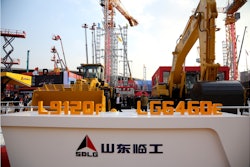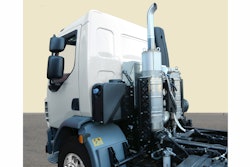The Volvo Group is renewing its partnership with a new ambitious commitment to the World Wide Fund for Nature’s Climate Savers programme. In addition to reducing emissions from products and production, Volvo is now driving the development toward reducing carbon-dioxide emissions throughout the transport sector.
“Our commitment to WWF will generate concrete progress, and demonstrates that we are serious about our emission reduction efforts that harmonize with our vision of sustainable and zero-emission transportation in the future. Climate Savers imposes very high demand on the Volvo Group, and we are proud to be able to continue the cooperation,” says Volvo President and CEO Olof Persson.
In 2010, the Volvo Group was the first producer of heavy trucks and vehicles in the world to join the WWF program Climate Savers. Climate Savers involves multi-national companies in the fight to reduce carbon-dioxide emissions. The companies included in Climate Savers pledge to reduce their carbon-dioxide emissions pursuant to an agreement between the company, WWF and independent technical experts.
The Volvo Group is still the only automotive manufacturer that is a member of Climate Savers and the unique strategic cooperation will now increase. In addition to a promise to reduce emissions from vehicles and production during the 2015 to 2020 period, Volvo will implement a number of activities aimed at accelerating the development toward lower and ultimately zero carbon emissions throughout the transport and construction sector.
The commitment includes:
- A cumulative reduction of emissions from products and production by at least 40 million tons of CO2 by 2020 compared with 2013.
- Developing a truck prototype with substantially lower fuel consumption compared with a corresponding truck today.
- Volvo CE will develop and demonstrate technologies with considerable efficiency improvements. Volvo CE estimates the new prototypes to be at least 30% better than a standard 2013 year model.
- Starting up a so-called City Mobility concept in at least five cities. City Mobility is the collective term for an offering in which Volvo Buses collaborates with cities and regions to find the best and most energy-efficient public transport solution. One example is to plan for the infrastructure required for electric city buses.
- Encourage and help 10 selected suppliers to improve energy efficiency.
- Hosting the Construction Climate Challenge (CCC) that aims to create a dialogue with construction industry representatives, academia and politicians, as well as providing funding for new research and share existing knowledge and resources to help the industry make a difference for generations to come.
"The transport sector has a very large impact on the climate. As part of a broader strategy to reduce global greenhouse gas emissions, voluntary initiatives from businesses are very important. The Volvo Group’s commitments are a good example of how the transport sector can and should bring down its emissions across the value chain, with potential to change the future of transportation and construction. I welcome Volvo’s commitment and encourage them to continue progressing towards ever more ambitious targets, and I hope their efforts will also encourage others to follow suit,” says Marco Lambertini, Director General of WWF International.
The Volvo Group launched the renewed cooperation with WWF during a press conference at the group’s Sustainability Forum on November 26.

















